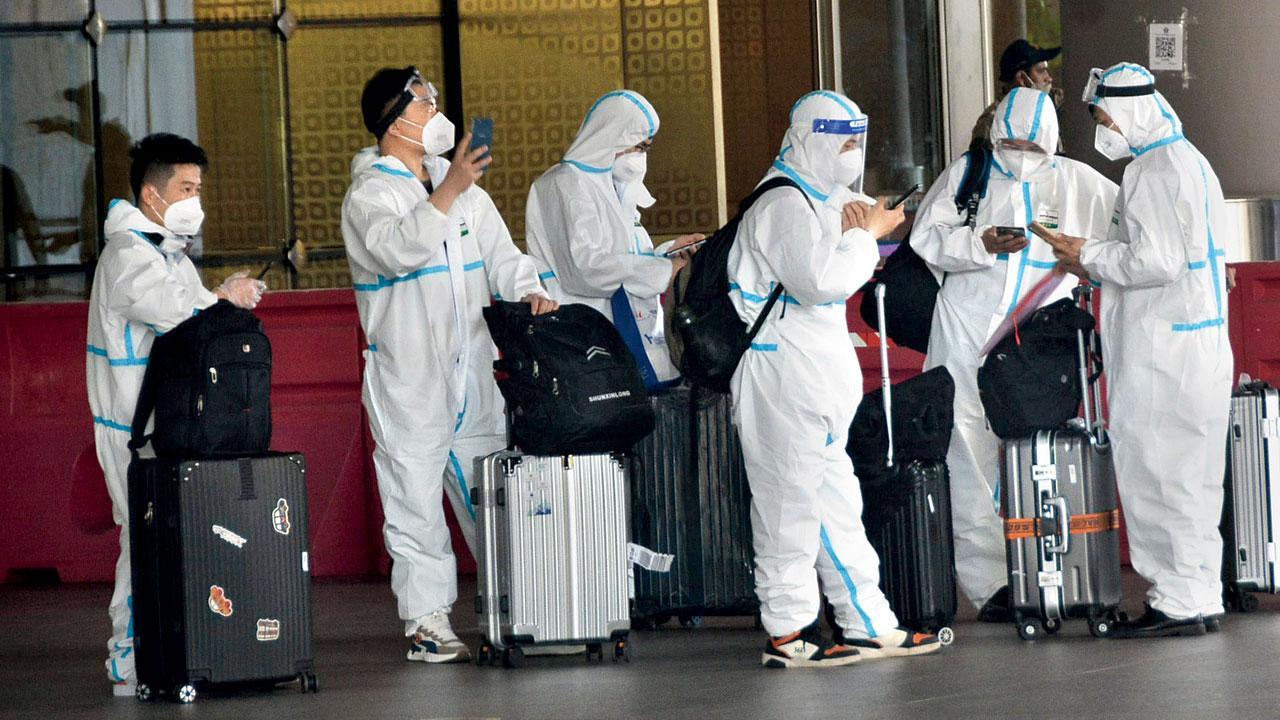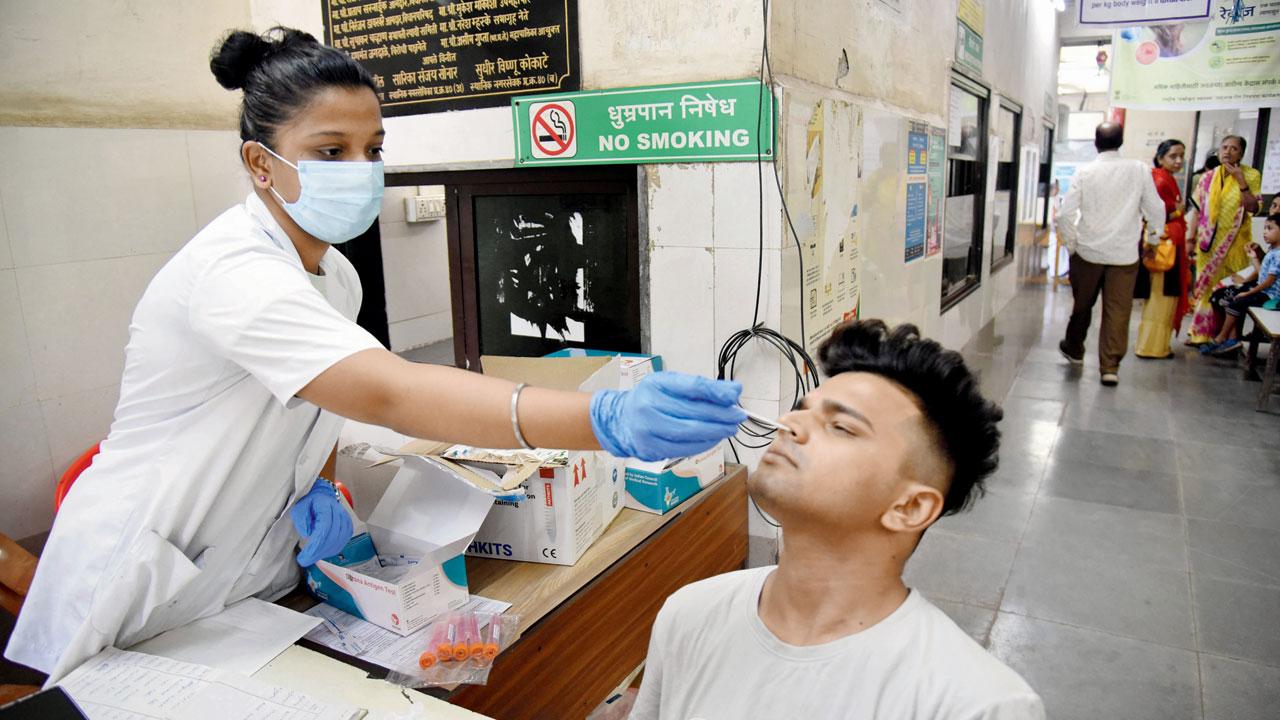Intense cold weather and vulnerability of elderly with comorbidities and declining immunities is providing an environment for Omicron sub-variants to keep mutating, eventually bypass vaccine immunity

Passengers being tested for Covid symptoms on their arrival at the international airport in February this year. File pic
The Covid-19 outbreak in China has caused the world to go into panic mode again, exactly three years after the first episode of SARS-CoV-2 was reported in December 2019. In the absence of clear reporting from China, the highly infectious and transmissible Omicron sub-variant BF.7 has left health experts and scientists across the world concerned because new sub-variants are not easily affected by the monoclonal antibodies of those who recovered from Covid-19 and even those who got vaccinated and took their booster. Other variants have been discovered by Columbia University, New York, and the findings were published in the international journal Cell, on December 13, 2022.
The Covid-19 outbreak in China has caused the world to go into panic mode again, exactly three years after the first episode of SARS-CoV-2 was reported in December 2019. In the absence of clear reporting from China, the highly infectious and transmissible Omicron sub-variant BF.7 has left health experts and scientists across the world concerned because new sub-variants are not easily affected by the monoclonal antibodies of those who recovered from Covid-19 and even those who got vaccinated and took their booster. Other variants have been discovered by Columbia University, New York, and the findings were published in the international journal Cell, on December 13, 2022.
‘We had warned you first’
mid-day in its August 18, 2022 article ‘Stay careful and alert for rebound Covid’ and subsequent piece ‘Experts fear complicated Covid cases in winter’, dated October 8, had highlighted how new Omicron sub-variants were causing hospitalisations in European nations and the US, and that India could see similar situation once the winter sets in.
 China, the US and South Korea are seeing a COVID-19 surge. File pic
China, the US and South Korea are seeing a COVID-19 surge. File pic
“The BQ.1, BQ.1.1 and BA.275 variants, as stated in the above mid-day reports, were the sequence sub-variants of Omicron and were emerging as a more virulent mutation of the virus, and BF.7 is believed to be the subsequent mutation of SARS-CoV-2 virus from the same Omicron family and of the same B-lineage of the genome,” said Dr Subhash Hira, professor of global health at the University of Washington, Seattle, and advisor to WHO-TDR-Geneva.
Also Read: Mumbai International Airport to restart Covid-19 preventive measures; BMC issues advisory
Asked why BF.7 needs to be taken seriously, Dr Hira explained, “The Omicron sub-variants are on a slippery slope, due to intense cold weather being experienced the world over and due to the vulnerability of the elderly population, with comorbidities and declining immunities, providing an adequate environment for Omicron sub-variants to keep mutating faster. Eventually, these new sub-variants are bypassing the vaccine/ booster immunity so far achieved in the populations. Therefore, a fresh Covid-19 pandemic is emerging the world over with new medical challenges,” explained Dr Hira.
Int’l journal sounds alarm
Dr Wiqar Shaikh, professor of medicine, Grant Medical College and Sir JJ Group of Hospitals, said the study published in Cell has scary and worrisome implications. Dr Shaikh said that the study concluded that four Omicron sub-variants, BQ.1, BQ.1.1, XBB and XBB1 are resistant to Covid-19 vaccines, even after booster doses. The findings of this study indicate that these sub-variants present a serious threat. The study also concludes that monoclonal antibodies, a very common treatment for Covid-19, are completely ineffective against these sub-variants.
 Dr Wiqar Shaikh
Dr Wiqar Shaikh
Dr Shaikh added that BQ.1 and BQ.1.1 currently account for 70 per cent of circulating variants worldwide. The four sub-variants in the study have successfully replaced BA.5, which was the common Omicron variant over the past year. Today, BA.5 accounts for only 10 per cent of Covid-19 in the world. Dr Shaikh also said that in the USA, in the past week, hospitalizations and deaths due to Covid-19 are up 18 per cent and 50 per cent respectively, yet another worrisome statistic.
The doctor is worried that the rapid replacement of Covid-19 strains is raising the spectre of yet another wave of the pandemic in the coming weeks. He added that it is indeed alarming that the virus continues to evolve and evade. Covid still lurking around Dr Shaikh warned that the pandemic has not come to an end as yet. China, Japan, USA and South Korea are in the middle of a surge in Covid-19 cases. He added that the current surge in China is caused by the BF.7 variant and alarmingly, cases of BF.7 have already been detected in India.
Genome surveillance
Dr Hira said the 22 Indian genomic surveillance centres could have been proactive with early warning signals of new mutants. “The entire world is at a loss with regard to credible information on the Chinese Covid-19 outbreak such as daily numbers, deaths, disease symptoms, and if it was caused by the ancestral or mutating sub-variants of Omicron, like the BF.7. Anecdotal information suggests that sub-variant BF.7 is highly transmissible with observed transmission rate (Ro) of infecting 16-18 persons from one patient. That places BA.7 transmissibility at par with the rate of spread of measles! If this is true, a model suggests that China will have 800 million new cases and one million deaths in the next three months. As it was established during the past waves that the immunocompromised and/or the elderly continue to be at a greater risk of illness and death,” said Dr Hira.
Symptoms may be mild
“As we all know now there is a Covid surge in China. We also found some cases in India of the China Covid variant, BF.7. Since we are already seeing how rapidly this variant is spreading in China, we must also be alert as the same situation can happen here in India. Most people are vaccinated and many already have been infected. So all of us must be having some immunity. This will help us to some extent. Because of this, we may witness mild symptoms. People with co-morbidities and low immunity should remain careful. Even healthy and immune people can pass on Covid to people with low immunity. So, everyone should protect themselves,” explained Dr Santosh Bansode, head of department, Emergency Medicine, Wockhardt Hospital, Mumbai Central.
Be watchful and alert
“Those who haven’t yet taken all vaccine doses should get the jab as fast as possible. We must wear masks in crowded places. We should follow Covid protective guidelines. We must keep an eye on the situation in China and other countries. Accordingly, we must change our Covid-related protocols regarding travel and work. We have witnessed how bad situations can occur if the number of patients increases. We must learn from our experiences, be alert and watchful,” said Dr Bansode.
Next three months crucial
“The future waves in India will likely overlap with those anticipated for China, the US, Korea, and Japan: Wave 1 from 15 December 2022 to 15 January 2023; scaled-up Wave 2 from mid-January to mid-February 2023, following the global New Year celebration season; and a plateaued Wave 3 from mid-February to end-March 2023 as winters recede and, therefore the next three months will be very crucial,” explained Dr Hira.
Follow Covid norms
Both Dr Shaikh and Dr Hira said that central and state governments should insist on adherence to Covid norms, with a mandate on wearing masks in public. This could at least lessen the impact of a new surge in India, if not prevent it completely, whereas other restrictions and protocols can be put in place as and when we see a surge.
22
No of Indian genomic surveillance centres
70
Percentage of circulating variants that BQ.1, BQ.1.1 account for
 Subscribe today by clicking the link and stay updated with the latest news!" Click here!
Subscribe today by clicking the link and stay updated with the latest news!" Click here!










